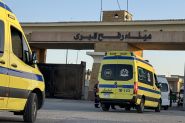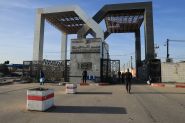- Home
- Middle East
- Gaza Deaths Surpass 18,200 as Fighting Rages

©(Photo by Menahem KAHANA / AFP)
Intense urban warfare unfolded on Monday, in Gaza during what has become the deadliest conflict, witnessing over 18,200 Palestinian casualties and the loss of 104 Israeli soldiers.
Heavy urban battles raged Monday in the bloodiest-ever war in Gaza, with more than 18,200 Palestinians and 104 Israeli soldiers reported dead amid a spiraling humanitarian crisis.
Brutal fighting continued in Gaza, with Islamic Jihad militants saying they blew up a house in the southern Gazan city of Khan Yunis where Israeli soldiers were searching for a tunnel shaft.
Israel had urged civilians to seek refuge in the far south, but the army has kept striking targets throughout the territory.
The last death toll from the Hamas-run health ministry was 18,205, mostly women and children.
Israeli Prime Minister Benjamin Netanyahu has called on Hamas to "surrender now", with his government claiming thousands of militants have been killed during the war, now in its third month.
The army said 500 militants have been arrested over the past month.
Amid growing pressure over the humanitarian conditions, Israel announced it would be screening aid to Gaza at two additional checkpoints, which would allow more assistance to enter the ravaged strip.
The EU's top diplomat Josep Borrell said in a speech that the "apocalyptic" destruction was proportionally "even greater" than that experienced by Germany in World War II.
Health services have been devastated, with only 14 of Gaza's 36 hospitals functioning at any capacity, according to UN humanitarian agency OCHA.
Al-Aqsa hospital in Deir al-Balah was inundated with victims Monday, including dozens of screaming children, after Israeli strikes on the nearby Al-Maghazi refugee camp.
Elsewhere, as basic supplies run out and sanitary conditions deteriorate, women and girls spoke of using scraps of cloth for menstrual periods.
Unable to obtain gas or even firewood for cooking, Gazans brought decades-old brass stoves to a workshop for repair.
"People have gone back to the old times," owner Ibrahim Shouman said.
The UN General Assembly will meet Tuesday to discuss the humanitarian crisis, after the United States last week vetoed a Security Council resolution for a ceasefire.
A group of Security Council ambassadors travelled to Egypt to meet Gazan victims on an informal trip.
The war was triggered by Hamas's October 7 attacks that killed some 1,200 people in southern Israel and saw dozens of hostages dragged back to Gaza.
Hamas has warned the remaining 137 hostages won't survive unless Israel meets its demands and frees more Palestinian prisoners.
Khalil Wakim, with AFP
Heavy urban battles raged Monday in the bloodiest-ever war in Gaza, with more than 18,200 Palestinians and 104 Israeli soldiers reported dead amid a spiraling humanitarian crisis.
Brutal fighting continued in Gaza, with Islamic Jihad militants saying they blew up a house in the southern Gazan city of Khan Yunis where Israeli soldiers were searching for a tunnel shaft.
Israel had urged civilians to seek refuge in the far south, but the army has kept striking targets throughout the territory.
The last death toll from the Hamas-run health ministry was 18,205, mostly women and children.
Israeli Prime Minister Benjamin Netanyahu has called on Hamas to "surrender now", with his government claiming thousands of militants have been killed during the war, now in its third month.
The army said 500 militants have been arrested over the past month.
Amid growing pressure over the humanitarian conditions, Israel announced it would be screening aid to Gaza at two additional checkpoints, which would allow more assistance to enter the ravaged strip.
The EU's top diplomat Josep Borrell said in a speech that the "apocalyptic" destruction was proportionally "even greater" than that experienced by Germany in World War II.
Health services have been devastated, with only 14 of Gaza's 36 hospitals functioning at any capacity, according to UN humanitarian agency OCHA.
Al-Aqsa hospital in Deir al-Balah was inundated with victims Monday, including dozens of screaming children, after Israeli strikes on the nearby Al-Maghazi refugee camp.
Elsewhere, as basic supplies run out and sanitary conditions deteriorate, women and girls spoke of using scraps of cloth for menstrual periods.
Unable to obtain gas or even firewood for cooking, Gazans brought decades-old brass stoves to a workshop for repair.
"People have gone back to the old times," owner Ibrahim Shouman said.
The UN General Assembly will meet Tuesday to discuss the humanitarian crisis, after the United States last week vetoed a Security Council resolution for a ceasefire.
A group of Security Council ambassadors travelled to Egypt to meet Gazan victims on an informal trip.
The war was triggered by Hamas's October 7 attacks that killed some 1,200 people in southern Israel and saw dozens of hostages dragged back to Gaza.
Hamas has warned the remaining 137 hostages won't survive unless Israel meets its demands and frees more Palestinian prisoners.
Khalil Wakim, with AFP
Read more



Comments